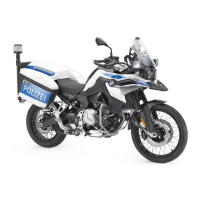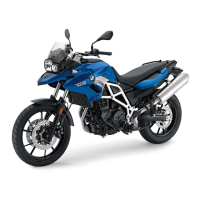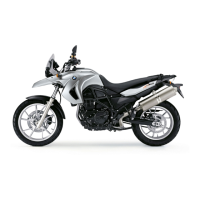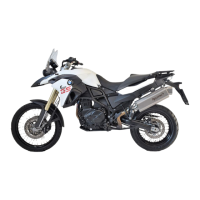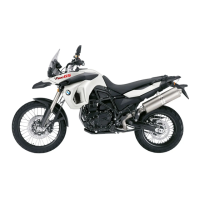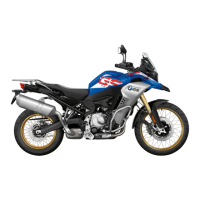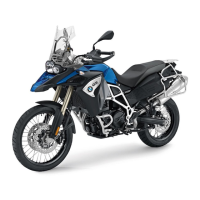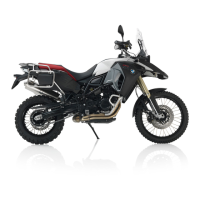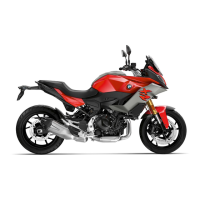Do you have a question about the BMW F 750 GS and is the answer not in the manual?
Explains symbols and abbreviations used throughout the manual for clarity.
Details the motorcycle's equipment, including optional features and accessories.
Explains the function, principle, and legal basis of the emergency call system.
Illustrates and labels key components visible from the motorcycle's left side.
Illustrates and labels key components visible from the motorcycle's right side.
Identifies components and storage located beneath the motorcycle seat.
Details the controls and functions of the left handlebar multifunction switch.
Details the controls and functions of the right handlebar multifunction switch.
Describes the layout and components of the motorcycle's instrument cluster.
Explains the instrument cluster features and indicators when connectivity is enabled.
Provides a comprehensive overview of the indicator and warning lights on the instrument cluster.
Explains the meaning and presentation of various warning lights and system alerts.
Guides on operating the ignition switch, securing the steering lock, and handling the vehicle keys.
Explains the procedure for operating the ignition without a physical key.
Details how to activate the emergency call system via BMW and manual activation.
Explains the operation of various motorcycle lights, including headlights and sidelights.
Describes how to navigate and select information displayed on the multifunction screen.
Explains how to switch the Dynamic Traction Control (DTC) system on or off.
Describes how to select and use different riding modes to optimize performance.
Guides on setting up and using the Adaptive Cruise Control system for maintaining speed.
Explains the activation, deactivation, and signals of the DWA anti-theft alarm system.
Details how to operate and adjust the heated handlebar grips for rider comfort.
Important warnings and considerations for using the TFT display and connected devices.
Explains the primary controls for operating the TFT display and its functions.
Details the process of pairing and connecting Bluetooth-enabled devices.
Guides on using the navigation system for setting destinations and route criteria.
Instructions for adjusting the rearview mirrors and their arms for optimal visibility.
Explains how to adjust the headlight beam for different riding conditions and regulations.
Covers checking and adjusting the clutch lever operation and play.
Details how to check brake operation, fluid levels, and pad wear.
Provides instructions for adjusting the rear suspension spring preload according to load.
Explains how to adjust the damping characteristic of the rear suspension for different road conditions.
Essential safety guidelines for rider's equipment and safe motorcycle operation.
Lists critical checks to perform on the motorcycle before riding.
Step-by-step guide for correctly starting the motorcycle's engine.
Explains the recommended procedures for the initial running-in period of the engine and tyres.
Details the operation of the gear shift assistant and manual gear changes.
Provides specific guidance for riding the motorcycle on unpaved or dirt roads.
Outlines the correct methods for parking the motorcycle safely on its stands.
Information on recommended fuel grade, capacity, and the refuelling process.
Explains the working principles, design, and limitations of the ABS system.
Details how the DTC system functions, its parameters, and optimal usage.
Explains the purpose and operation of the dynamic engine brake control system.
Describes the Dynamic ESA system, its sensors, and adjustment possibilities.
Details the different riding modes and their impact on vehicle systems and performance.
Lists the tools provided in the motorcycle's toolkit for basic maintenance tasks.
Guides on checking and topping up the engine oil level correctly.
Covers checks for brake operation, fluid levels, and pad wear.
Explains how to check and top up the coolant level in the expansion tank.
Details how to check tyre pressures and tread depth according to specifications.
Provides instructions for lubricating, checking tension, and inspecting the drive chain.
Outlines battery maintenance, charging, and removal procedures.
Important notes on using accessories and ensuring compliance with regulations.
Explains the use and automatic shutdown features of the motorcycle's power sockets.
Details the usage and specifications of the USB charging socket.
Guides on opening, closing, adjusting volume, and payload of the motorcycle cases.
Instructions for opening, closing, adjusting volume, and payload of the topcase.
Explains how to secure, operate, and manage the navigation system.
Recommends using specific cleaning and care products for optimal vehicle protection.
Provides guidance on the proper procedure for washing the motorcycle.
Details how to clean delicate parts like plastics, windscreens, and the TFT display.
Offers advice on protecting the paintwork from environmental factors and cleaning marks.
Recommends products and methods for preserving the vehicle's paint finish.
Instructions for preparing the motorcycle for storage, including fuel and battery.
Provides solutions for common issues like engine not starting or Bluetooth connection problems.
Lists specific torque values for various screw connections on the motorcycle.
Specifies recommended fuel grade, capacity, consumption, and emissions data.
Details engine oil capacity, specification, and additive recommendations.
Provides technical specifications for the motorcycle's engine, including displacement and power.
Lists technical details about the clutch type and transmission ratios.
Technical details regarding the gearbox type and transmission ratios.
Technical details about the final drive type and chain deflection.
Provides technical data on the motorcycle's frame and suspension systems.
Details technical specifications for the front and rear brake systems.
Outlines recommended tyre combinations and speed categories.
Lists specifications for the main fuse, fuse box, and electrical ratings.
Provides detailed measurements of the motorcycle, including length, height, and seat height.
Lists vehicle kerb weight, permissible gross weight, and maximum payload.
Details the motorcycle's top speed under various conditions.
Provides information on how to report safety-related defects to relevant authorities.
Explains the BMW Motorrad service network and the importance of regular maintenance.
Details how the service history is recorded and its importance for warranty.
Outlines the BMW pre-delivery check, running-in check, and standard service intervals.
Provides a detailed schedule of required maintenance tasks based on mileage and time.
Lists the tasks included in the standard BMW Service scope for confirmation.
Provides a table format for confirming performed service work, dates, and odometer readings.
Formal EU declaration for the electronic immobiliser system as per Radio Equipment Directive.
Formal EU declaration for the Keyless Ride system, including country-specific compliance.
Formal EU declaration for the tyre pressure control system, listing technical details.
Formal EU declaration for the TFT instrument cluster radio equipment, with country details.
Formal EU declaration for the intelligent emergency call system, including technical information.
Formal EU declaration for the anti-theft alarm system, covering technical specifications.
FCC and Industry Canada certification information for the Keyless Ride ID Device and its operating conditions.
German EU declaration of conformity for the Keyless Ride radio equipment, with compliance statements.
UK EU declaration of conformity for the Keyless Ride radio equipment, with compliance statements.
French EU declaration of conformity for the Keyless Ride radio equipment, with compliance statements.
FCC and Industry Canada certification information for the Keyless Ride ID Device and its operational conditions.
German EU declaration of conformity for the TFT instrument cluster radio equipment, with technical details.
UK EU declaration of conformity for the TFT instrument cluster radio equipment, with technical details.
French EU declaration of conformity for the TFT instrument cluster radio equipment, with technical details.
FCC and Industry Canada certification for the Tire Pressure Control (TPC) device, including operational conditions.
German EU declaration of conformity for the TFT instrument cluster radio equipment, with technical details.
UK EU declaration of conformity for the TFT instrument cluster radio equipment, with technical details.
French EU declaration of conformity for the TFT instrument cluster radio equipment, with technical details.
German EU declaration of conformity for the intelligent emergency call radio equipment, with technical data.
UK EU declaration of conformity for the intelligent emergency call radio equipment, with technical data.
French EU declaration of conformity for the intelligent emergency call radio equipment, with technical data.
| Displacement | 853 cc |
|---|---|
| Bore x Stroke | 84 mm x 77 mm |
| Power | 77 hp (57 kW) at 7, 500 rpm |
| Torque | 83 Nm at 6, 000 rpm |
| Compression Ratio | 12.7:1 |
| Fuel System | Electronic fuel injection |
| Final Drive | Chain |
| Frame | Bridge-type frame, steel shell construction |
| ABS | BMW Motorrad ABS |
| Length | 2, 255 mm |
| Width | 922 mm |
| Height | 1, 225 mm |
| Wheelbase | 1, 559 mm |
| Wet Weight | 224 kg |
| Fuel Capacity | 15 liters |
| Tyre, Front | 110/80 R19 |
| Tyre, Rear | 150/70 R17 |
| Engine Type | Water-cooled, 4-stroke in-line two-cylinder engine, four valves per cylinder, two overhead camshafts |
| Clutch | Multiple-disc wet clutch, mechanically operated |
| Transmission | 6-speed |
| Front Suspension | Telescopic fork |
| Rear Suspension | Cast aluminum dual swing arm |
| Front Brake | Double disc brake |
| Rear Brake | Single disc brake |
| Seat Height | 815 mm |
